Programs Offered
B.Tech. (Computer Science & Engineering (AI & ML))
Intake – 60
Core Competencies
- Data Sciences
- Machine Learning
- Image Processing
- IOT
- FOSSEE
Vision
To emerge as a distinguished department, fostering skilled AI developers through top-notch education, interdisciplinary collaboration, industry readiness, and impactful research for the betterment of society.
Mission
- Offer excellent training using creative AI concepts and technologies.
- Shape students into skilled and responsible professionals.
- Teach ethics, values, leadership, and teamwork for real-world challenges.
- Lead in AI education and research by creating centers of excellence.
About CSE(AI&ML) Department
Overview
Established in 2022, the Computer Science and Engineering (AI & ML) Department commenced with an initial intake of 60 students, which has since burgeoned to 180. The department offers a comprehensive program in Artificial Intelligence & Machine Learning (AI&ML), seamlessly guiding students from foundational principles to advanced neural network applications. The curriculum adeptly blends theory and practical exposure, equipping students for both traditional Machine Learning and cutting-edge AI. The immersive core curriculum facilitates a deep grasp of AI’s theoretical framework and practical applications, forming a robust foundation for exploring intricate AI&ML challenges within diverse domains. The program’s industry pertinence is evident through its emphasis on practical skills and real-world problem-solving. Regular curriculum updates ensure alignment with the latest industry trends. From fundamental concepts to advanced applications, the program empowers students to flourish within AI&ML’s evolving landscape, effectively priming them for success in the industry. The Department of AI & ML stands as an activity hub, offering students a chance to actively engage in learning through participation in Workshops, Seminars, Certifications, Hackathons, Tech-Fests, and R&D ventures. In fostering self-driven learning, the department establishes Technical Clubs to augment student knowledge. With a focus on research and a hands-on learning approach, a cadre of expert faculty has cemented the department’s reputation as a premier destination for AI & ML education.
Prominent Features
Student Training and Internships: The CSE (AI&ML) Department collaborates with Hexart to offer a comprehensive student training program.
Cutting-Edge Laboratories: Our advanced computing laboratories boast state-of-the-art configurations, enriched with both hardware and software resources. This environment enables hands-on learning in Robotics, IoT, Coding, AI, Machine Learning, and Tinkering.
Mentor-Mentee System: A robust mentor-mentee system is in place, ensuring strong guidance and support for students.
Academic Excellence and Placement: We maintain a track record of excellent academics and successful placement activities.
Scholarship Opportunities: Meritorious students are rewarded with scholarships annually.
24/7 Data Centre Availability: A high-end data centre with 24/7 access to advanced equipment, including rack servers and routers, supports students’ learning needs.
Experienced Faculty: Our department is staffed with well-qualified and experienced faculty members.
Diverse Learning Options: We provide additional offerings such as Virtual Lab Classes, Live Classes, Tutorials, and Certificate Courses by esteemed professors.
Industry-Driven Curriculum: Our curriculum includes Robotics, Machine Learning, Cloud Technologies, Mobile Application Development, Data Analytics, and other latest technologies to align with industry expectations.
Mou’s
CSE(AI&ML) Team
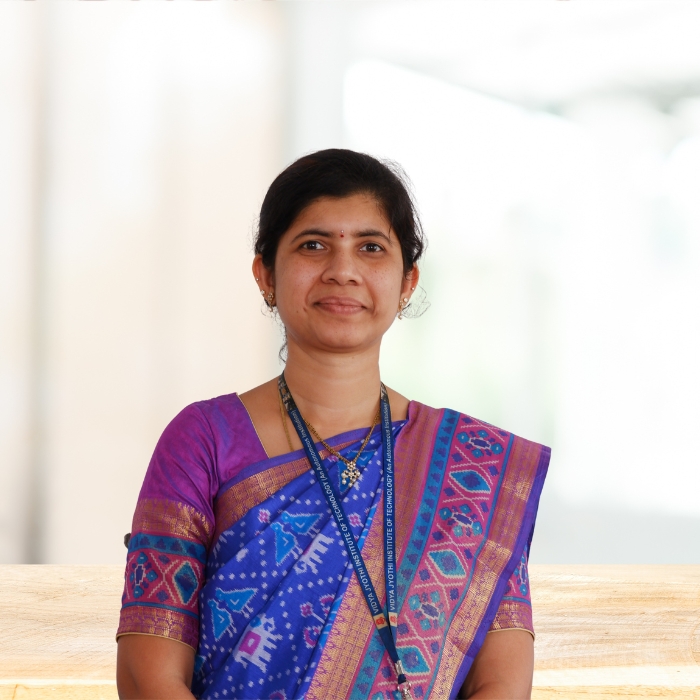
Dr. N. Anusha
B.Tech, M.Tech, Ph.D
Head of the Department
Dr. N. Anusha holds a B.Tech. degree, completed in the year 2006 from Aurora’s Engineering College, Bhongir, Telangana. She pursued her M.Tech. in Advanced Computing, graduating in 2008 from SASTRA University, Tanjore, Tamil Nadu. Later, she accomplished her Ph.D. in Computer Science and Engineering in 2021 from Satyabhama Institute of Science and Technology (Deemed to be University), Chennai, Tamil Nadu. With an impressive 14+ years of experience in academia, research, and industry, she brings a wealth of knowledge to her field. Her areas of expertise span Artificial Intelligence & Machine Learning, Remote Sensing & GIS, Image Processing, and Cloud Computing.
Dr.Anusha’s pursuit of knowledge extended to her selection and successful completion of NNRMS-ISRO Sponsored Certificate Course in Remote Sensing & GIS Technology and Applications, with a specialization in Natural Hazards & Disaster Risk Management (NHDRM) at the prestigious INDIAN INSTITUTE OF REMOTE SENSING (IIRS), under the aegis of the Government of India and the Indian Space Research Organisation. Her portfolio includes projects in the domain of Unmanned Aerial Vehicle images using Deep Learning Techniques, showcasing her expertise in Microwave Remote Sensing Applications and Geospatial Technologies. Notably, she is involved with the ANURAGSAT project and serves as the Coordinator for the On-Board Computer Subsystem of a CubeSat, scheduled for launch as part of the ‘75 Students’ Satellites Mission 2022.’
Dr.Anusha’s dedication extended to her role as a mentor for finalists in the Youth for Social Impact (YFSI) program, held in collaboration with Telangana State Innovation Council (TSCI), UNICEF, and T-hub. Additionally, she takes on the role of Coordinator for IIRS. Her leadership qualities are further demonstrated as the Convener for the international conference ICCIDE 2023, as well as the coordinator for the Computer Vision club, associated with Unistring Technology Solutions Pvt. Ltd., Hyderabad, India, for students.
Her contributions extend into the realm of academia, as a diligent reviewer for esteemed National and International Journals & Conferences. Dr.Anusha’s academic journey is punctuated by the publication of over 40+ technical research articles in a variety of SCI/Scopus National and International Journals, Conference Proceedings, and Book chapters. Her guidance has shaped the execution of 8 PG projects and 17 UG projects, and she has even secured a patent in the domain of deep learning.
A proactive organizer, Dr. Anusha has orchestrated a spectrum of FDPs, Hackathons, and Workshops, solidifying her commitment to knowledge dissemination. Her affiliation extends to esteemed memberships in ISRS, CERF, and IAENG Societies, where she actively engages with the academic and research community.
Faculty Members
| Name | Designation |
| Dr. N. Anusha | HOD |
| Ms Naikoty Nandini | Assistant Professor |
| Mr Kumar Nagraj | Assistant Professor |
| Mr Y Kalyan Babu | Assistant Professor |
| Dr S Sathappan | Associate Professor |
Outcome Based Education
PEO's
PEO2: Graduates will be able to use their knowledge and abilities to grow in their careers, pursue advanced degrees and develop entrepreneur skills.
PEO3: To be engaged in life-long learning and research activities and promote societal progress.
PO's
Engineering Graduates will be able to:
- Engineering knowledge: Apply the knowledge of mathematics, science, engineering fundamentals, and an engineering specialization for the solution of complex engineering problems.
- Problem analysis: Identify, formulate, research literature, and analyze complex engineering problems reaching substantiated conclusions using first principles of mathematics, natural sciences, and engineering sciences.
- Design/development of solutions: Design solutions for complex engineering problems and design system components or processes that meet the specified needs with appropriate consideration for public health and safety, and cultural, societal, and environmental considerations.
- Conduct investigations of complex problems: Use research-based knowledge and research methods including design of experiments, analysis and interpretation of data, and synthesis of t h e information to provide valid conclusions.
- Modern tool usage: Create, select, and apply appropriate techniques, resources, and modern engineering and IT tools, including prediction and modelling to complex engineering activities, with an understanding of the limitations.
- The engineer and society: Apply reasoning informed by the contextual knowledge to assess societal, health, safety, legal, and cultural issues and the consequent responsibilities relevant to the professional engineering practice.
- Environment and sustainability: Understand the impact of the professional engineering solutions in societal and environmental contexts, and demonstrate the knowledge of, and need for sustainable development.
- Ethics: Apply ethical principles and commit to professional ethics and responsibilities and norms of the engineering practice.
- Individual and team work: Function effectively as an individual, and as a member or leader in diverse teams, and in multidisciplinary settings.
- Communication: Communicate effectively on complex engineering activities with the engineering community and with the society at large, such as, being able to comprehend and write effective reports and design documentation, make effective presentations, and give and receive clear instructions.
- Project management and finance: Demonstrate knowledge and understanding of the engineering and management principles and apply these to one’s own work, as a member and leader in a team, to manage projects and in multidisciplinary environments.
- Life-long learning:Recognize the need for, and have the preparation and ability to engage in independent and life-long learning in the broadest context of technological change.
PSO's
PSO1: Acquire the practical skills in emerging technologies and in-open source platforms related to artificial intelligence and
PSO2: Apply relevant techniques and modern emerging tools in the areas of Healthcare, Education, Agriculture, Smart systems & in all multi-disciplinary problems.
PSO3: An innovative career path to entrepreneurship and life-long learning with moral and ethical values.
Life @ CSE(AI&ML) Department
Facilities
Events / Activities / News
Stay connected and informed with latest engineering news and events, and engage with the college community.
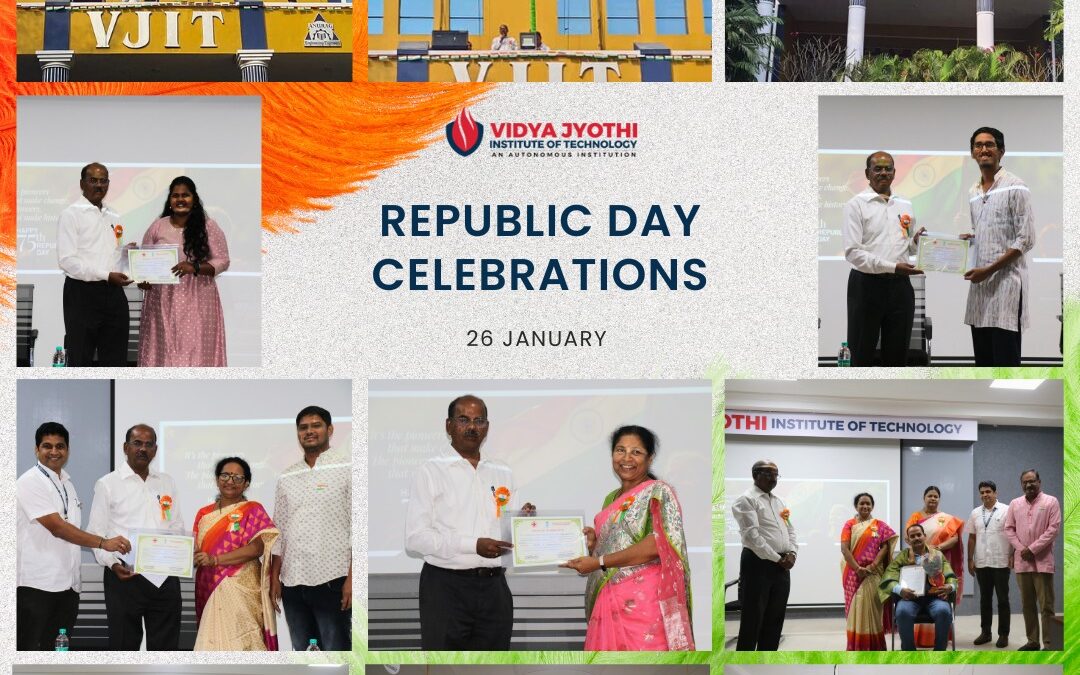
75th Republic Day Celebration
The 75th Republic Day celebration at Vidya Jyothi Institute of Technology (VJIT) was marked by national pride and...
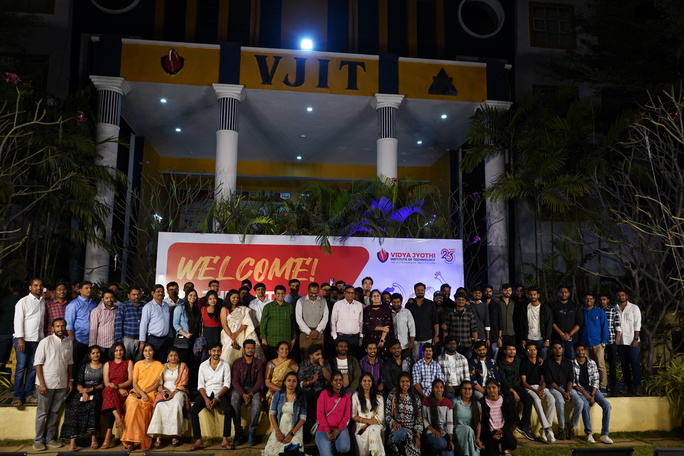
Alumni 2024
The VJIT Alumni Reunion, held on January 6, 2024, emerged as a triumphant gathering that brought together graduates...
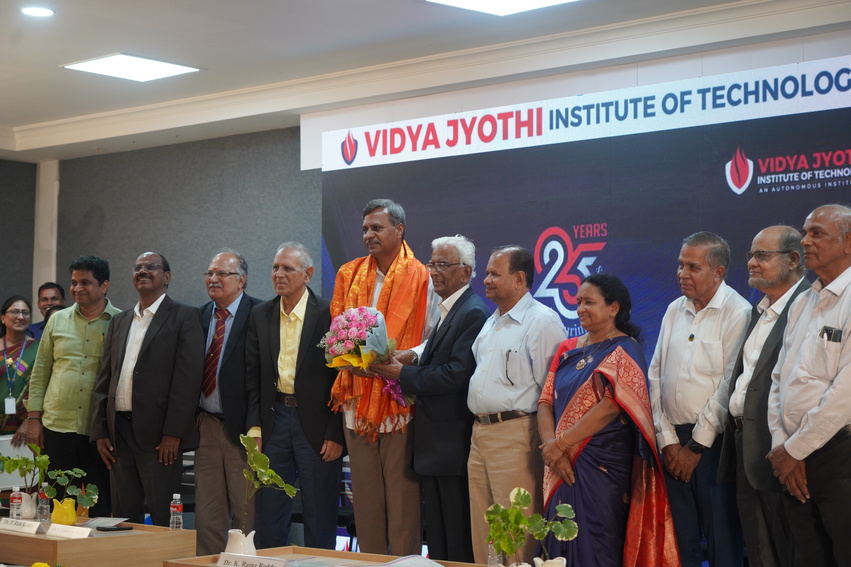
Silver Jubilee celebrations
The Silver Jubilee celebrations at Vidya Jyothi Institute of Technology has been a grand tribute to a quarter-century...
Received Young Engineer Award & Best Thesis Award by ACCE(I)
Celebrating Remarkable Achievements at VJIT! A heartfelt congratulations to our outstanding individuals: Dr....
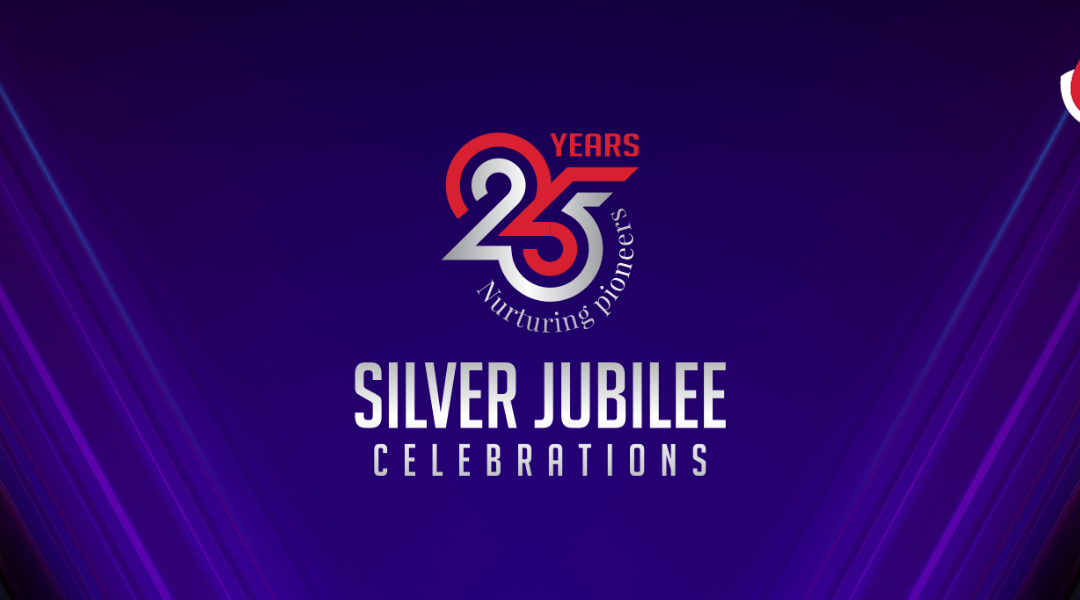
Silver Jubilee Celebrations of VJIT
You are cordially invited to the grand celebrations of the "Silver Jubilee of VJIT" on January 3, 2024, at 11:00 AM....
Algorand Block Chain Club Inauguration at VJIT!
The establishment of the Algorand Blockchain Club on December 22, 2023 at VJIT by the Department of Information...
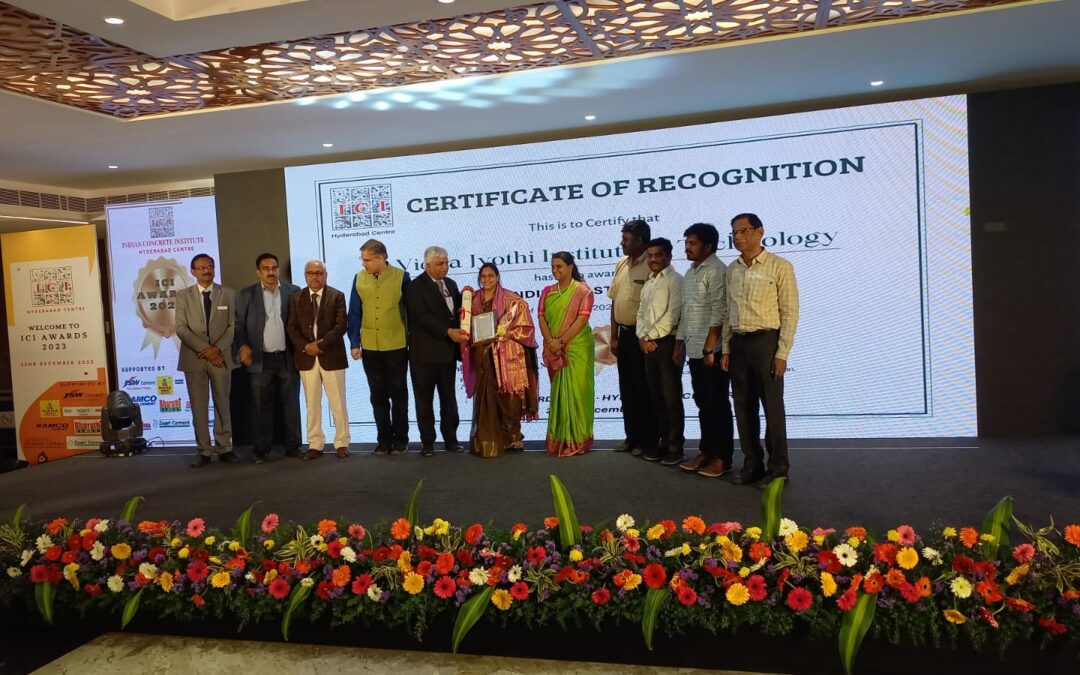
ICI Student Chapter Award at Telangana level from Indian Concrete Institute (ICI) HYDC
Civil Engineering department, VJIT Received Outstanding ICI Student Chapter Award at Telangana level for the year 2023...
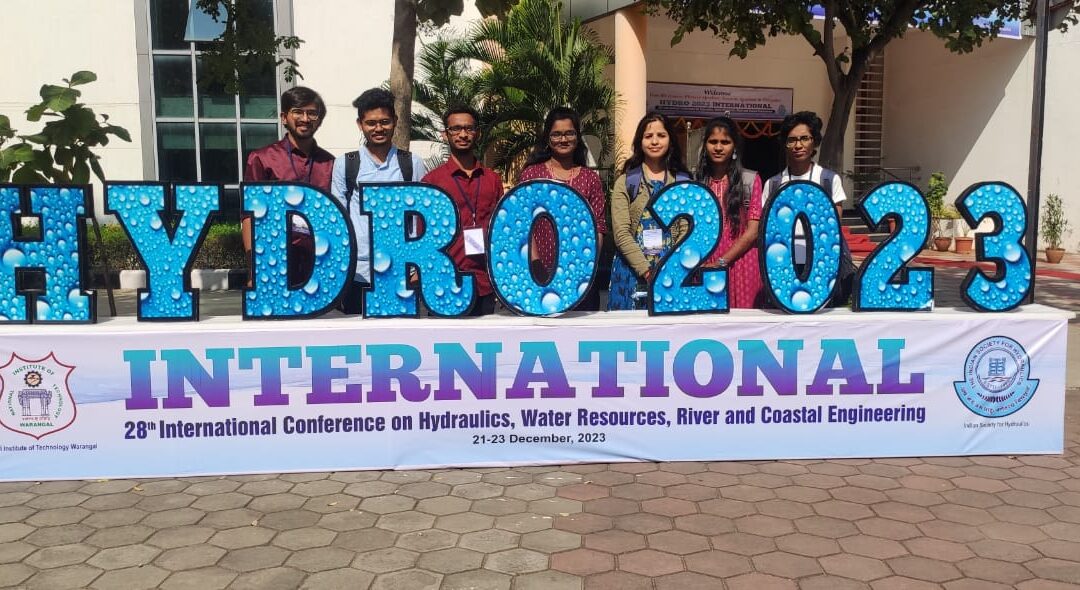
HYDRO 2023 Conference
It is prestigious to be a part of HYDRO 2023 INTERNATIONAL, 28th International Conference on Hydraulics, Water...
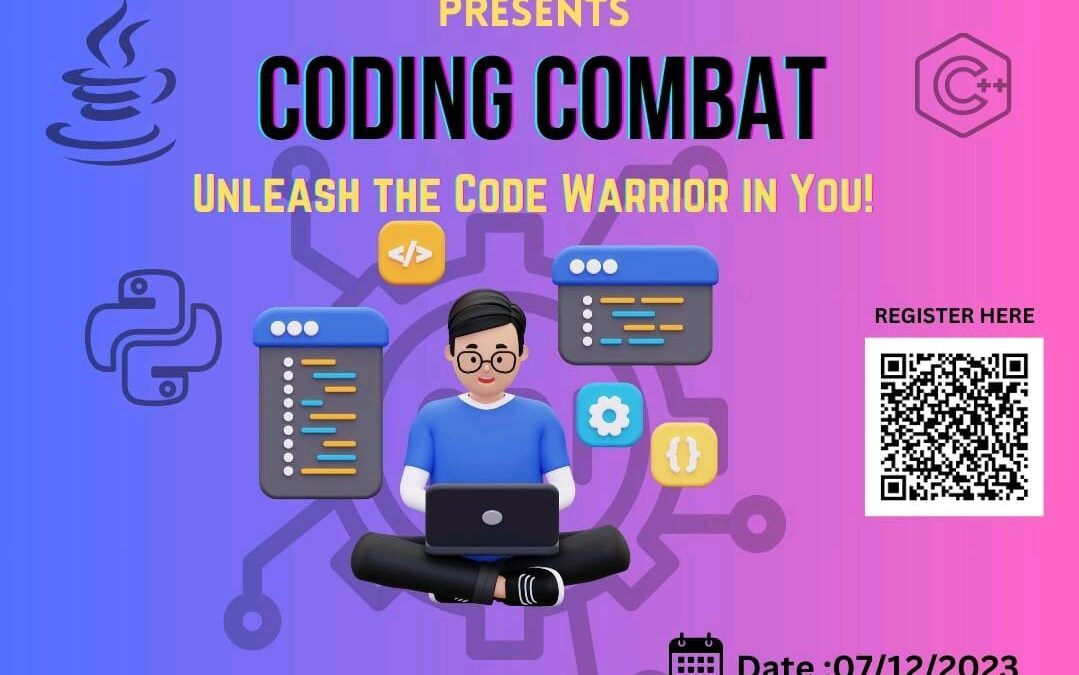
VJIT’s Coding Combat!
Today, we extend heartfelt appreciation to all the brilliant minds who participated in the Coding Combat program...
Offline AICTE-sponsored ATAL Faculty Development Program (FDP) on Recent AI Applications in Medical & Agriculture
Greetings from Department of Artificial Intelligence, Vidya Jyothi Institute of Technology- Hyderabad. We are pleased...
Guest Lecture on Block Chain Technology
VJIT welcomed Kiran Dutta, the Founder of Web3Learn, for an enlightening session on Blockchain technology on November...
Congratulations
Our Civil Engineering Department, VJIT, UG student Mr. Vishal, Volleyball team put up an outstanding performance at...
Achievements
Department Achievements
Faculty Achievements
- Anusha successful completed NNRMS-ISRO Sponsored Certificate Course in Remote Sensing & GIS Technology and Applications, with a specialization in Natural Hazards & Disaster Risk Management (NHDRM) at the prestigious INDIAN INSTITUTE OF REMOTE SENSING (IIRS), under the aegis of the Government of India and the Indian Space Research Organisation (ISRO).
- Anusha was as a mentor for finalists in the Youth for Social Impact (YFSI) program, held in collaboration with Telangana State Innovation Council (TSCI), UNICEF, and T-hub.
- Anusha, published a paper titled “Land Use Land Cover Classification Using Multi-Spectral Sentinel-2b Satellite Image” in ARPN Journal of Engineering and Applied Sciences, 17(11), pp. 1166–1174 (Indexed in Scopus)
- Anusha is a Coordinator for IIRS, Indian Space Research Organisation (ISRO) and J-Hub, JNTUH.
- Anusha Organized J-Hub Hackathon and Boot camp for Hyderabad region in association with JHub, JNTUH.
- Anusha, attended “Public Participation for Disaster Risk Management in Indian Terrain in collaboration with Central University Jharkhand, Ranchi”, organized by National Institute of Disaster Management, Ministry of Home Affairs, Govt. of India in collaboration with Central University.
- Anusha, Detection and Classification of Vegetation Areas from Red and Near Infrared Bands of Landsat-8 Optical Satellite Image in Applied Computer Science, Vol. 18, No. 1, pp. 45–55 (Indexed in Scopus)
- Anusha, published a paper titled Flood Detection and Flood Mapping Using Multi-temporal Synthetic Aperture Radar and Optical Data in Egyptian Journal of Remote Sensing and Space Sciences, Vol. 23, No. 2, pp. 207-219 (Indexed in Web of Science & Scopus)
- Anusha is the coordinator for the Computer Vision club, associated with Unistring Technology Solutions Pvt. Ltd., Hyderabad, India, for VJIT students.
- Anusha has esteemed memberships in Indian Society of Remote Sensing (ISRS), CERF, and IAENG Societies.
- Anusha, attended “Occupational Health Hazards and Safety Measures for Health Care Workers”, organized by National Institute of Disaster Management, Ministry of Home Affairs, Govt. of India in collaboration with MPUAT Udaipur.
- Anusha Organized a Hackathon on Menstrual Waste Management in association with Water-aid and T-hub.
- Anusha, attended NPTEL Online Certification, “Operating System Fundamentals”, Type of certificate – Elite.
- Anusha, published book chapter titled Automated Speckle Noise Suppression from Sentinel-1A Synthetic Aperture Radar Imagery Using Adaptive Filtering Techniques in Lecture Notes in Networks and Systems , 2023, 383, pp. 777–795 (Web of Science & Scopus)
- Anusha, organized a Workshop on Augumented Reality.
- Anusha, organized a Workshop on Game Development using Unity Engine.
- Anusha, published a paper titled Weather Prediction Using Multi Linear Regression Algorithm in IOP Conference Series: Materials Science and Engineering, Conference Organized by (Sathyabama Institute of Science and Technology, India) (Indexed in Scopus)
- Anusha, attended “Two Day International Conference on Challenges to Disaster Risk Reduction and Resilient Habitat”, organized by National Institute of Disaster Management, Ministry of Home Affairs, Govt. of India in collaboration with Shaheed Bhagat Singh College University of Delhi.
- Anusha, published a paper titled An overview on Change Detection and a Case Study Using Multi-temporal Satellite Imagery,International Conference on Computational Intelligence in Data Science(ICCIDS 2019),IEEE,Conference Organized by (SSN College of Engineering, India) (Indexed in Web of Science & Scopus)
- Anusha, published a paper titled Automatic Flood Detection in Multi-Temporal Sentinel-1 Synthetic Aperture Radar Imagery Using ANN Algorithms in International Journal of Computers communication & Control, Vol. 15, No. 3, pp. 1-19 (Indexed in Web of Science & Scopus)
- Anusha, published a paper titled Weather prediction using neural network backpropagation in ARPN Journal of Engineering and Applied Sciences, Vol. 14, No. 24, pp. 4289-4294 (Indexed in Scopus)
- Anusha, published a paper titled Despeckling of Synthetic Aperture Radar Satellite Imagery Using Various Filtering Techniques in ARPN Journal of Engineering and Applied Sciences, Vol. 14, No. 19, pp. 3401-3407 (Indexed in Scopus)
- Anusha, published a paper titled Change detection and flood water mapping using Sentinel-1A Synthetic Aperture Radar images in Journal of Computational and Theoretical Nanoscience, Vol. 16, pp. 3544-3549 (Indexed in Scopus)
- Anusha, published a paper titled Morphotectonics of Wan River Sub-basin Using Remote Sensing and GIS Approach in Journal of Geoscience Research, Vol. 4, No.2, pp. 163-172.
- Anusha, published a paper titled Image Segmentation Using ToZero Method and ToZero Inverse Methods in ARPN Journal of Engineering and Applied Sciences, Vol. 13, Issue. 16, pp. 4678-4682, (Indexed in Scopus)
- Anusha, published a paper titled Segmentation of Multi-temporal Images Using Gaussian Mixture Model (GMM) in ARPN Journal of Engineering and Applied Sciences, Vol. 13, Issue. 16, pp. 4633-4640 (Indexed in Scopus)
- Anusha, published a paper titled Locker System: Development of Intelligence Surveillance Using Secure One Time Password and Face Recognition in ARPN Journal of Engineering and Applied Sciences, Vol. 12, Issue. 17, pp. 5003-5010 (Indexed in Scopus)
- Anusha, published a paper titled Secure Auditing of Shared Data in Private Cloud Using Email Notification in ARPN Journal of Engineering and Applied Sciences, Vol. 12, Issue. 17, pp. 4953-4959 (Indexed in Scopus)
- N Anusha, published a paper titled Android Location Based Reminder Including Step Counting Distance and Calorie Measuring in Research Journal of Pharmaceutical, Biological and Chemical Sciences, RJPBCS, Vol. 7, Issue. 6, pp. 1427 – 1434 ( Indexed in Web of Science & Scopus)
- Anusha, published a paper titled Secured Health Records Storage & Retrieval System Using Keyword Based, Key Generation and Attribute Based Encryption (ABE) in Research Journal of Pharmaceutical, Biological and Chemical Sciences, RJPBCS, Vol. 7, Issue. 6, pp. 1420 – 1426 (Indexed in Web of Science & Scopus)
- Anusha, published a paper titled Speech Analysis for Gender and Emotion Classification Using Classifier Techinique in Research Journal of Pharmaceutical, Biological and Chemical Sciences, RJPBCS, Vol. 7, Issue. 3, pp. 1409 – 1415 .(Indexed in Web of Science & Scopus)
- Anusha, published a paper titled Role Based Content Access Control in NDN inJournal of Innovative Technology and Education, HIKARI Ltd, Vol. 2, Issue. 1, pp. 65 – 73.
- Anusha, published a paper titled Private Searching Keyword Frequency Using Homomorphic Encryption in Journal of Theoretical and Applied Information Technology, JATIT & LLS, Vol. 79, Issue. 2, pp. 225-230 ( Indexed in Scopus)
- Anusha, published a paper titled Secured Data Aggregation on Multiple Sensor Applications in International Journal of Applied Engineering Research, Research India Publications, Volume 10, no. 5, pp. 13063-13071 (Indexed in Scopus)
- Anusha, published a paper titled Evaluation of Spatial Query Processing in Spatial Database in International Journal of Applied Engineering Research, Research India Publications, Vol. 10, Issue. 2, pp. 4395-4402 (Indexed in Scopus)
- Anusha, published a paper titled Dynamic Data Security Considerations In Multi-Cloud Storage in International Journal of Applied Engineering Research, Research India Publications, Vol. 10, Issue. 2, pp. 3947-3955 (Indexed in Scopus)
- Anusha, published a paper titled Analysis of Document Images through Local Binary Patterns in Indian Journal of Science and Technology, Vol. 10, Issue. 20,pp.1-6 (Indexed in Web of Science)
- Anusha, published a paper titled Confidential Data Access Control in Named Data Networking in Indian Journal of Science and Technology, Vol. 10, Issue. 12,pp.1-6.(Indexed in Web of Science)
- N Anusha, published a paper titled Automatic Toll Payment, Alcohol Detection, Loan and Vehicle Information Using Internet of Things & Mailing System in 2017 International Conference on Intelligent Computing and Control (I2C2), IEEE, Conference Organized by (Karpagam College of Engineering ,India), pp- 1-5. (Indexed in Web of Science & Scopus)
- Anusha, published a paper titled Locker Security System Using Facial Recognition and One Time Password (OTP) in 2017 International Conference on Wireless Communications, Signal Processing and Networking (WiSPNET), IEEE, Conference Organized by (SSN College of Engineering, India), pp. 812-815. (Indexed in Web of Science & Scopus)
- Anusha, published a paper titled Secure Auditing of Private Cloud Data Associated With Multiple Owners Using E-mail Notification in 2017 International Conference on Wireless Communications, Signal Processing and Networking (WiSPNET), IEEE, Conference Organized by (SSN College of Engineering, India), pp. 809-811. (Indexed in Web of Science & Scopus)
- Anusha, published a paper titled Sensor Based Application for Malware Detection in Android OS(Operating System) Devices in 2017 International Conference on Information Communication and Embedded Systems (ICICES),IEEE, Conference Organized by (S.A Engineering College, India).pp. 1-6. (Indexed in Web of Science & Scopus)
- Anusha, published a paper titled Text Separation in Document Images through Otsu’s Method in 2016 International Conference on Wireless Communications, Signal Processing and Networking (WiSPNET), IEEE, Conference Organized by (SSN College of Engineering, India), pp. 2395-2399. (Indexed in Web of Science & Scopus)
- Anusha, attended AICTE Training And Learning (ATAL) Academy online Elementary FDP,”GIS & REMOTE SENSING”, Organized by National Power Training Institute-Shivpuri (M.P.).
- Anusha, attended AICTE Training And Learning (ATAL) Academy online Elementary FDP, “Recent Trends and Applications of GIS & Remote Sensing using AI”, Organized by Potti Sriramulu Chalavadi Mallikarjuna Rao College of Engineering & Technology.
- Anusha, attended “Recent Advancements in Cloud computing”, Organised by Department of Computer Science and Engineering & Skill and Personality Development Center, Sathyabama Institute of Science and Technology (Deemed-to-be University), Chennai, India.
- Anusha, attended Bhuvan Overview, Organized by National Remote Sensing Centre(NRSC), Indian Space Research Organization(ISRO), Hyderabad, India.
- Anusha, attended “Two Day National Online Workshop on Python Programming”, Chaitanya Bharathi Institute of Technology (A), Hyderabad, Telangana.
- Anusha, attended “Flood Management using remote sensing, GIS and Bathymetry”, National Institute of Disaster Management, Ministry of Home Affairs, Govt. of India.
- Anusha, attended Integrating Scopus in Research Workflow, Research Academy on Campus, Elsevier.
- Anusha, attended “Disaster Risk Reduction in Oil and Gas sector”, National Institute of Disaster Management, Ministry of Home Affairs, Govt. of India in collaboration with IPSHEM-ONGC Goa
- Anusha, attended Public Information and Media Management in Disaster Situation, Organized by National Institute of Disaster Management, Ministry of Home Affairs, Govt. of India.
- Anusha, attended Hill Area Environment, Climate Change, Sustainable Development and Landslide Risk Reduction & Resilience, Organized by National Institute of Disaster Management, Ministry of Home Affairs, Govt. of India in Collaboration with Indian Institute of Technology, Guwahati.
- Anusha, attended Faculty Development Program on AI Using Python, Organized by School of Computing, Sathyabama Institute of Science and Technology (Deemed-to-be University), Chennai, India.
- Anusha, attended 3-day online Training programme on “Media and Disaster Management”, Organized by National Institute of Disaster Management, Ministry of Home Affairs, Govt. of India.
- Anusha, attended Transforming Disaster’s Challenges into Opportunities” (Prime Minister Agenda Point 9: Opportunity to learn from a disaster, must not be wasted), Organized by National Institute of Disaster Management, Ministry of Home Affairs, Govt. of India.
- Anusha, attended 6 Days Faculty Development Programme in “Research Skill Development ” through online Pedagogy, Organized by School of Computing, Sathyabama Institute of Science and Technology (Deemed-to-be University), Chennai, India.
- Anusha, attended Online webinar programme on Landslide risk reduction and resilience, Organized by National Institute of Disaster Management, Ministry of Home Affairs, Govt. of India in collaboration with Geological Survey of India, Ministry of Mines, Govt. of India.
- Anusha, attended 5 days online FDP on ‘Python 3.4.3’, Organised by Sathyabama Institute of Science and Technology (Deemed-to-be University), Chennai, in association with Spoken Tutorial IIT Bombay, an initiative of National Mission on Education through ICT of MHRD, Govt. of India.
- Anusha, attended Bio-Medical Imaging: Advanced FLIM-FRET Microscopy Techniques for Cellular Imaging, Organized by Anna University, Chennai, India.
- Anusha, attended Applications of Remote Sensing and GIS with Special Reference to Disaster Management, Organized by Centre for Remote Sensing and Geoinformatics, Sathyabama Institute of Science and Technology (Deemed-to-be University), Chennai, India.
- Anusha, attended Microwave Remote Sensing Applications, Organized by National Remote Sensing Centre(NRSC),Indian Space Research Organization(ISRO), Hyderabad, India.
- Anusha, attended Geospatial Technologies and Applications, Organized by National Remote Sensing Centre(NRSC),Indian Space Research Organization(ISRO), Hyderabad, India.
- Anusha, attended NWIPCV’17 National Workshop on Image Processing & Computer Vision, Organized by Sathyabama Institute of Science and Technology, Chennai, India.
- Anusha, attended NRIPM 17′ National Level Two days Workshop On Research Oriented Approaches on Biomedical Image Processing using Matlab, Organized by B.S Abdur Rahman University, Chennai, India.
- Anusha, attended Two-Days Workshop on Machine Learning Techniques for Image-Based Applications, Organized by SSN College of Engineering, Chennai, India.
- Anusha, attended User Awareness Program at Sathyabama Institute of Science and Technology, Jointly Organized by Springer Nature and Sathyabama Institute of Science and Technology, Chennai, India.
- Hephzi Punithavathi, published a book titled ‘Artificial Intelligence’, Scientific International Publishing, ISBN Number: 978-93-5625-497-8.
- Hephzi Punithavathi, published a paper titled “Intelligent Deep-Learning-Enabled Decision-Making Medical System for Pancreatic Tumor Classification on CT Images”, in Healthcare.
- Hephzi Punithavathi, published a paper “Bird Swarm Algorithm with Fuzzy Min-Max Neural Network for Financial Crisis Prediction”, in Computers, Materials & Continua.
- S.Hephzi Punithavathi, published a paper titled, “Optimal Dense Convolutional Neural Network Model for Image Classification in Unmanned Aerial Vehicles based Adhoc Networks”, in International Journal of Ad Hoc and Ubiquitous Computing.
- Hephzi Punithavathi I. S, published “Deep Learning based Intelligent and Sustainable Smart Healthcare Application in Cloud-Centric IoT” in Computers, Materials & Continua.
- Hephzi Punithavathi, I.S, published ‘Intensive Detection of Diabetic Retinopathy Stages by Integrated Active Learning based SVM’, in Sensor Letters.
- Hephzi Punithavathi, I.S, published, ‘Multi Criterial Analysis of Retinal Images for Diabetic Retinopathy’, in Asian Journal of Information Technology.
- Hephzi Punithavathi, I.S, published, ‘Annotation and Retrieval of Retinal Images using Support Vector Machine with Active Learning’, Proceedings of IEEE International Conference on Intelligent Techniques in Control Optimization and Signal Processing.
- S.Hephzi Punithavathi, published paper titled, ‘Severity Grading of Diabetic Retinopathy using Extreme Learning Machine’, Proceedings of IEEE International Conference on Intelligent Techniques in Control Optimization and Signal Processing
- Acted as Reviewer for IEEE International Conferences and Springer.
- Attended International and National FDPs in recent technologies like Machine Learning, Blockchain and Cybersecurity.
- Completed NPTEL Courses in Introduction to Machine Learning, Deep Learning.
- Manjula, Paper PublishedTitle on“Performance Improvement Of Safety Update For Logout Activity “ in Scopus.
- Manjula, Paper Published Title“Uncovering Fraudulent Apps with Machine Learning Techniques “in International Journal of System Design and Information Processing (SDIP).
- Manjula, Paper Published TitleOn “Traffic Prediction for Intelligent Transportation Systems Using Machine Learning“ in International Journal of System Design and Information Processing (SDIP) .
- Manjula attended International and National FDPs in recent technologie: Python Programming ,Cyber Security.
Student Achievements
Professional Bodies & Clubs
Professional Bodies
- CSI
- ISTE
- ACM Chapter
- Google Development Society
- IEEE-CS Chapter
- IUCEE IASF-chapter
Clubs
- Coding Club
- Machine Learning Club
- Data Science Club
- Gaming Club
- IoT Club
- Robotics Club
- Drone Club
- Deep Learning Club
Industry & Academic Collaborations
Other Information
The AI Dept itself and the H&S Dept organizes different activities for the enhancement of the knowledge of the students and to improve their Life Skills, Soft Skills and Technical Skills. The different activities are –
- Guest Lectures
- Coding contest
- Science Project Exhibition
- Software Project Exhibition
- Poster Exhibition
- Special Classes on Coding at evening hrs for doubt clearance
- Online classes during off days and All India Lockdown Days
- Online test on different subjects
- Quiz
- Seminar by the students
- Value added courses
- Certifications
Value Added Courses
- AWS Cloud Literacy Course
- MOOC on “C and Data Structures”
- CISCO Networking Course
- Machine Learning MOOC at Coursera.org
- CS50X MOOC by Harvard University at edx.org
- Python MOOC at Udemy.com
- Ethical Hacking MOOC at Udemy.com
- “C Programming” at Udemy.com
- Cognizia A
- Microsoft Azure
Resources
Teaching & Learning
Innovative Teaching Techniques
Teaching is an art and science. Teaching is a process of imparting knowledge and skills. It is a systematic process based on some educational objectives to communicate.
The following innovative teaching methods are being adopted:
Interactive Learning
Interactive learning can take many different forms. Students strengthen their critical thinking and problem-solving skills using a much more holistic approach to learning. Interactive learning can take place across the curriculum with technology.
Collaborative Learning
“Collaborative learning is an umbrella term for a variety of educational approaches involving joint intellectual effort by students, or students and teachers together. Usually students are working in groups of two or more, mutually searching for understanding, solutions or meanings, or creating a product.
Collaborative learning activities vary widely, but most center on students’ exploration or application of the course material, not simply the teacher’s presentation or explication of it”.
Why use cooperative learning? To..
- promote student learning and academic achievement
- enhance student satisfaction with their learning experience
- help students develop skills in oral communication
- develop students skills
- promote student self-esteem
5 Elements of cooperative learning
- Positive interdependence
- Face-to-face interaction
- Individual and group accountability
- Interpersonal and small group skills
- Group processing
Flipped Classroom
A flipped classroom is an instructional strategy and a type of blended learning that reverses the traditional learning environment by delivering instructional content, often online, outside of the classroom. It moves activities, including those that may have traditionally been considered homework, into the classroom. In a flipped classroom, students watch online lectures, collaborate in online discussions, or carry out research at home and engage in concepts in the classroom with the guidance of a mentor.
The flipped classroom intentionally shifts instruction to a learner-centered model in which class time explores topics in greater depth and creates meaningful learning opportunities, while educational technologies such as online videos are used to ‘deliver content’ outside of the classroom. In a flipped classroom, ‘content delivery’ may take a variety of forms.
Role Play
Role-playing is the changing of one’s behavior to assume a role, either unconsciously to fill a social role, or consciously to act out an adopted role.
- To refer to the playing of roles generally such as in a theatre, or educational setting;
- To refer to taking a role of an existing character or person and acting it out with a partner taking someone else’s role, often involving different genres of practice.
Think-Pair-Share
Think-Pair-Share (TPS) is a collaborative learning strategy in which students work together to solve a problem or answer a question about an assigned reading. This technique requires students to (1) think individually about a topic or answer to a question; and (2) share ideas with classmates. Discussing an answer with a partner serves to maximize participation, focus attention and engage students in comprehending the reading material.
Benefits:
- The Think-Pair-Share strategy is a versatile and simple technique for improving students’ reading comprehension.
- It gives students time to think about an answer and activates prior knowledge.
- TPS enhances students’ oral communication skills as they discuss their ideas with one another.
- This strategy helps students become active participants in learning and can include writing as a way of organizing thoughts generated from discussions.
Case Based Learning
This method is learner-centered with intense interaction between participants as they build their knowledge and work together as a group to examine the case
The instructor’s role is to facilitate the students collaboratively analyze and address problems and resolve questions
Interactive Learning
Interactive Learning is a hands-on, real-world approach to education ‘Inetractive learning actively engages the students in wrestling with the material
It reinvigorates the classroom for both students and faculty. Lectures are changed into discussion and students and teachers become partners in the journey of knowledge acquisition
Students strengthen their critical thinking and problem-solving skills using a much more holistic approach to learning
Open Educational Resources
Open educational resources (OER) are freely accessible, openly licensed documents and media that are useful for teaching, learning, and research resources that reside in the public domain or have been released under an intellectual property license that permits their free use and re-purposing by others.
Open educational resources include full courses, course materials, modules, textbooks, streaming videos, tests, software, and any other tools, materials, or techniques used to support access to knowledge.
Like Blog, MOOC(Massive Open Online Course), Moodle etc.
Teaching & Learning methodologies
| Faculty Name | Subject | Topic | Innovative methods adopted | Preparation |
| Dr.A.Obulesh | MFCS | Logic | Prolog is sued to show Logic execution | The online tool to execute Prolog is shown and demo is given. Student are given problem to solve. Interactive Online Tool is used : https://swish.swi-prolog.org/ |
| Dr.A.Obulesh | MFCS | WFF : Well Formed Formula | Student’s Seminar | Students have been given real life problems to derive WWF |
| Dr.A.Obulesh | AI | AI Algorithms | AWS Classroom | Students should be good in basic AI algorithms. |
| Kandula Neha | CDS | Programming (Arrays, Stacks, Queues) | Hacker Rank | Students should be good at basic Algorithms and Syntax of concepts |
| Kandula Neha | CDS | Algorithms and logics | Innovative Mini Projects | Students should explain with real life examples |
| K.Kalyani | CL | Cyber Crimes | Students Seminar | Students should explain with real life example cases |
| K.Kalyani | CL | IT Act 2000 | Innovative quiz | Well preparation about IT act 2000 |
| Dr.A.Obulesh | Robotics | Robotics lab | Case Studies | Students should explain with real life examples |
| Ch.Swetha | Concepts of DataStructures through C++ | Trees and Graphs Algorithms | Mini Projects | Students should explain with real life examples |
| D.Vaman Ravi Prasad | MFCS | Pigeon Hole Principle | Poster Presentation | Students should explain Poster with the given topic |
Curriculum
Research & Development
Overview
The Dept of Artificial Intelligence is presently working in the following fields of research.
- Data Analytics
- Data Engineering
- Data Science
- Machine Learning
- Artificial Intelligence
- Coding in AI, M, DS and DL – Python, R, Octave etc.
Publications
Placements
Placements Information
Roll of Honors
Toppers – Batch Wise
Toppers – Semester Wise
Contact Us
Dr. N. Anusha
Professor, HOD
[email protected]
